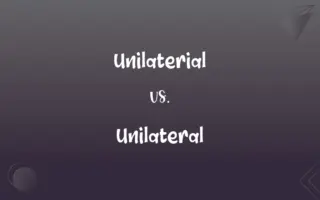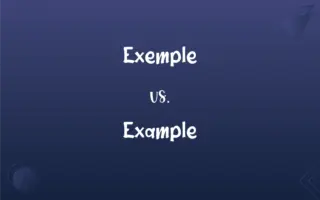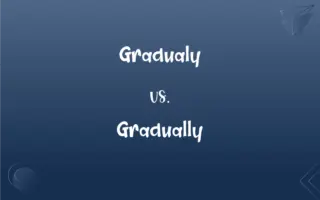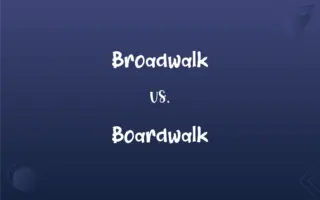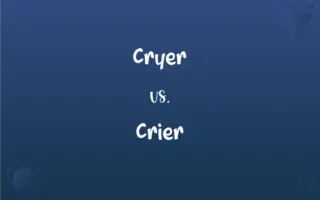Posessive vs. Possessive: Mastering the Correct Spelling
Edited by Harlon Moss || By Janet White || Updated on March 9, 2024
"Posessive" is incorrect, while "Possessive" is correct, referring to a form that shows ownership or relation.
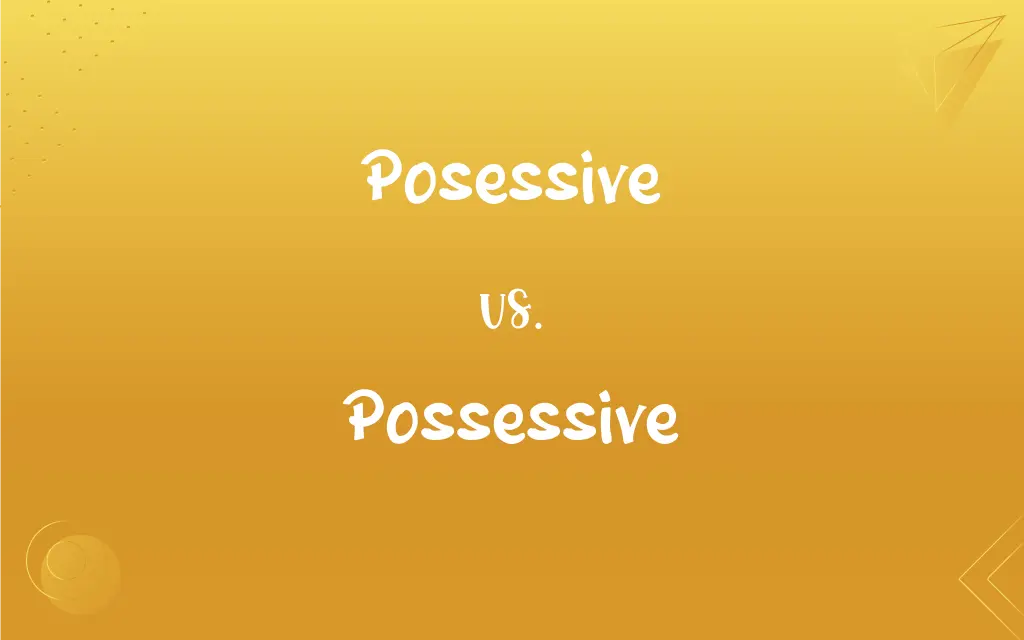
Which is correct: Posessive or Possessive
How to spell Possessive?

Posessive is Incorrect

Possessive is Correct
ADVERTISEMENT
Key Differences
"Possessive" contains two S's like "possession," which it signifies.
Think “owning possessions” requires extra 's' in "Possessive."
“Possess” forms the base, which contains double S's.
"Possessive" mirrors "processive," with a double S.
“Possessive” has the stress on the second syllable, just like “obsessive,” another word with double S's.
ADVERTISEMENT
Correct usage of Possessive
The dog's posessive behavior over its food was concerning.
The dog's possessive behavior over its food was concerning.
She showed a posessive attitude towards her toys.
She showed a possessive attitude towards her toys.
His posessive nature made friendships difficult.
His possessive nature made friendships difficult.
Her essay was marked down for incorrect posessive pronoun usage.
Her essay was marked down for incorrect possessive pronoun usage.
They didn't like the character's posessive relationship in the story.
They didn't like the character's possessive relationship in the story.
Possessive Definitions
Jealously guarding
Possessive of her time.
Overly protective or controlling
A possessive mother.
Desiring to own or dominate
His possessive behavior.
In grammar, indicating possession
Possessive pronouns.
Of or relating to ownership or possession.
Having or manifesting a desire to control or dominate another, especially in order to limit that person's relationships with others
A possessive parent.
(Grammar) Of, relating to, or being a noun or pronoun case that indicates possession.
The possessive case.
A possessive form or construction.
Of or pertaining to ownership or possession.
(grammar) Indicating ownership, possession, origin, etc.
Unwilling to yield possession of.
He is very possessive of his car.
(grammar) The possessive case.
(grammar) A word used to indicate the possessive case.
Of or pertaining to possession; having or indicating possession.
A possessive pronoun, or a word in the possessive case.
Serving to express or indicate possession;
Possessive pronouns
The genitive endings
Desirous of owning;
Small children are so possessive they will not let others play with their toys
Having or showing a desire to control or dominate;
A possessive parent
Showing ownership or relation
Her possessive case.
Possessive Sentences
The possessive form of "dog" is "dog's."
My sister's possessive about her books and rarely lends them out.
The teacher explained how to form the possessive case of singular and plural nouns.
A possessive noun can be formed by adding an apostrophe and s to the end of a word.
She corrected the student's use of possessive nouns in the essay.
It's important to understand possessive pronouns in English grammar.
In English, possessive adjectives include my, your, his, her, its, our, and their.
Their possessive love for the land led them to conservation efforts.
The possessive case is used to indicate ownership or close association.
Her diary is full of entries that express possessive feelings.
The movie explores the theme of possessive passion and its consequences.
Possessive relationships can sometimes be unhealthy.
He has a possessive attachment to his old car, refusing to sell it.
The child showed a possessive instinct towards the new puppy.
In the story, the pirate's possessive greed for treasure leads to his downfall.
The cat displayed possessive aggression when approached by the dog.
A common mistake in English is misplacing the apostrophe in possessive nouns.
Understanding the difference between possessive and plural forms is crucial in grammar.
Grammar lessons often start with the basics of possessive adjectives and pronouns.
She is possessive of her privacy and rarely shares personal information.
The novel examines the effects of a possessive mother on her son's life.
Using possessive pronouns correctly improves your writing.
Possessive behavior can stem from insecurity or fear of loss.
His possessive demeanor towards his colleagues created tension at work.
FAQs
What is the pronunciation of Possessive?
Pronounced as puh-ZES-iv.
What is the verb form of Possessive?
The related verb is "possess."
What is the root word of Possessive?
The root word is "possess," meaning to own or have.
What is the plural form of Possessive?
The plural form is "possessives."
Why is it called Possessive?
It's called "Possessive" because it indicates possession or ownership, either grammatically or behaviorally.
Which article is used with Possessive?
Both definite (the) and indefinite (a, an) articles may be used, depending on context.
Which vowel is used before Possessive?
The vowel "e" is used before "Possessive."
What is the singular form of Possessive?
The singular form is "possessive."
Is Possessive a vowel or consonant?
"Possessive" is a word, containing both vowels and consonants.
Is the Possessive term a metaphor?
Not typically; it's usually literal but can be used metaphorically in literature.
Which conjunction is used with Possessive?
No specific conjunction is tied to "Possessive"; it depends on sentence context.
Is Possessive an abstract noun?
As a concept or quality, it can be considered an abstract noun, but it's also used concretely in grammar.
Is Possessive a countable noun?
When referring to the grammatical forms, it's countable (e.g., "two possessive forms").
Which preposition is used with Possessive?
No specific preposition is tied to "Possessive"; it depends on sentence context.
Is Possessive a negative or positive word?
It's neutral but can have a negative connotation in contexts implying over-control or jealousy.
How many syllables are in Possessive?
There are three syllables.
What is the first form of Possessive?
"Possessive" doesn't have verb forms, so it doesn't have a first form.
What is the second form of Possessive?
"Possessive" doesn't have verb forms, so it doesn't have a second form.
Is Possessive an adverb?
No, "Possessive" is not an adverb.
Is Possessive a collective noun?
No, it's not a collective noun.
Is the word Possessive imperative?
No, it's not an imperative; it's a noun or an adjective.
How do we divide Possessive into syllables?
It is divided as: pos-ses-sive.
What is another term for Possessive?
In grammar, another term is "possessive case." In behavior, "jealous" or "overprotective" might apply.
What is the third form of Possessive?
"Possessive" doesn't have verb forms, so it doesn't have a third form.
Is Possessive a noun or adjective?
"Possessive" can be both a noun (as in the grammatical term) and an adjective (describing a tendency).
What part of speech is Possessive?
"Possessive" can be a noun or an adjective.
What is the opposite of Possessive?
The opposite could be "generous" or "sharing" in behavior, or "non-possessive" grammatically.
Which determiner is used with Possessive?
No specific determiner is exclusively used; it depends on the sentence.
What is a stressed syllable in Possessive?
The stress is on the second syllable: -ses-.
How is Possessive used in a sentence?
In grammar: "In 'Sarah's dog,' 'Sarah's' is a possessive form indicating ownership." In behavior: "His possessive tendencies strained the relationship."
About Author
Written by
Janet WhiteJanet White has been an esteemed writer and blogger for Difference Wiki. Holding a Master's degree in Science and Medical Journalism from the prestigious Boston University, she has consistently demonstrated her expertise and passion for her field. When she's not immersed in her work, Janet relishes her time exercising, delving into a good book, and cherishing moments with friends and family.
Edited by
Harlon MossHarlon is a seasoned quality moderator and accomplished content writer for Difference Wiki. An alumnus of the prestigious University of California, he earned his degree in Computer Science. Leveraging his academic background, Harlon brings a meticulous and informed perspective to his work, ensuring content accuracy and excellence.
